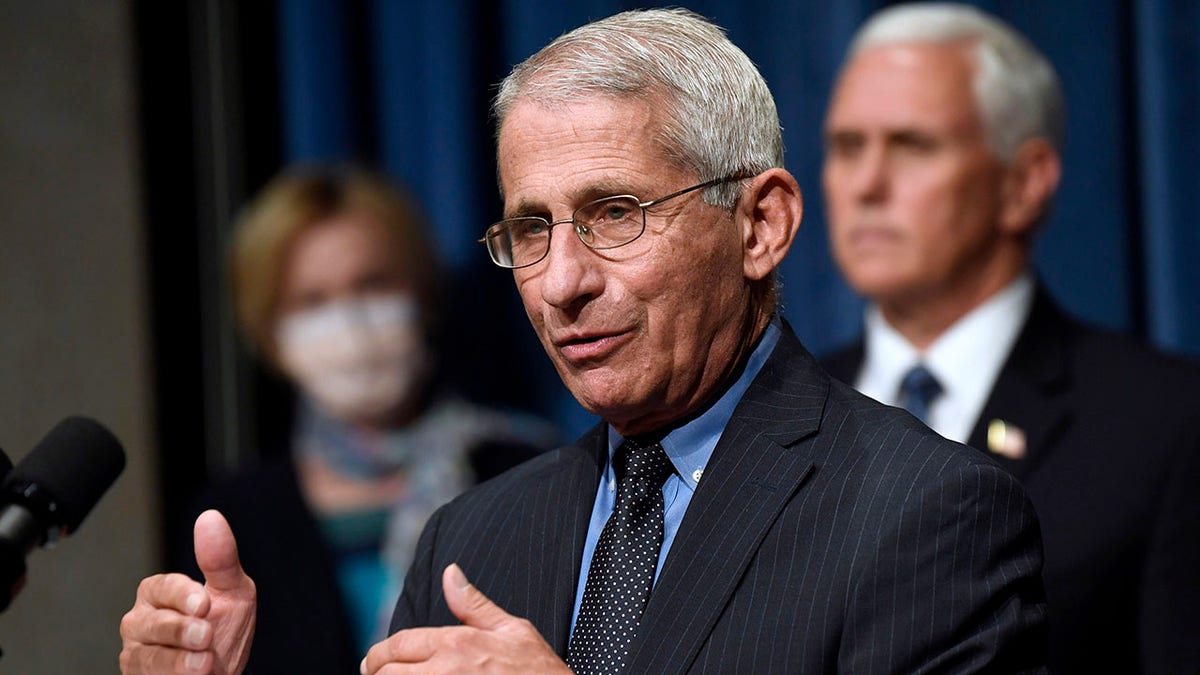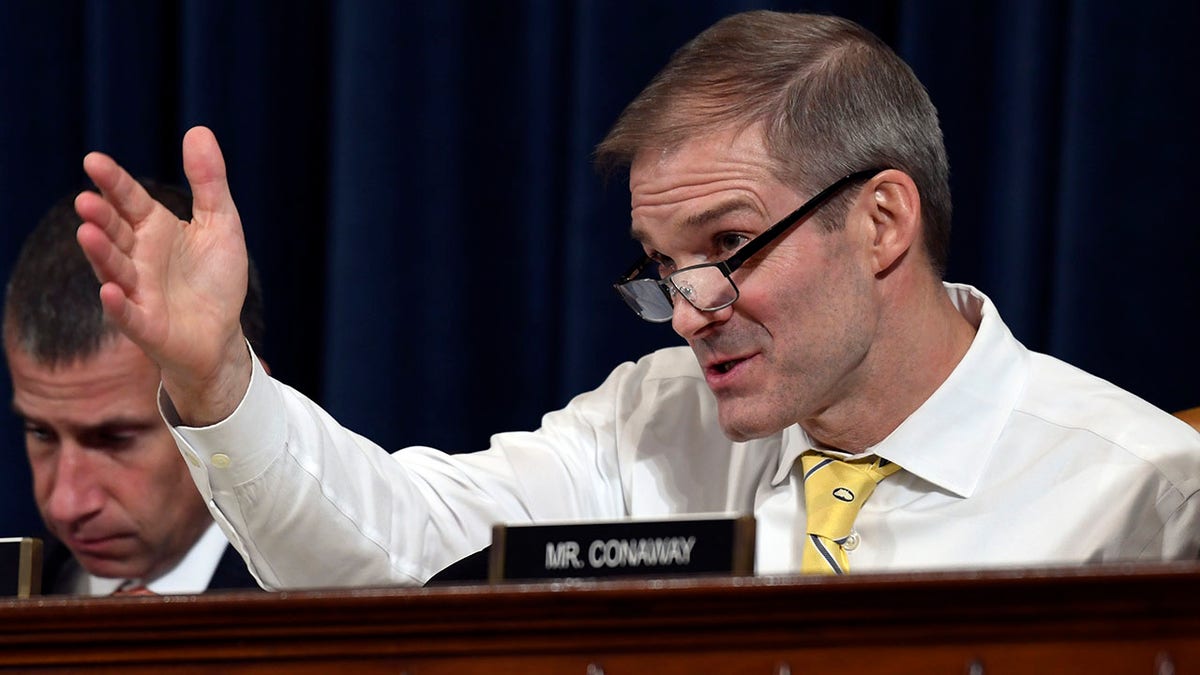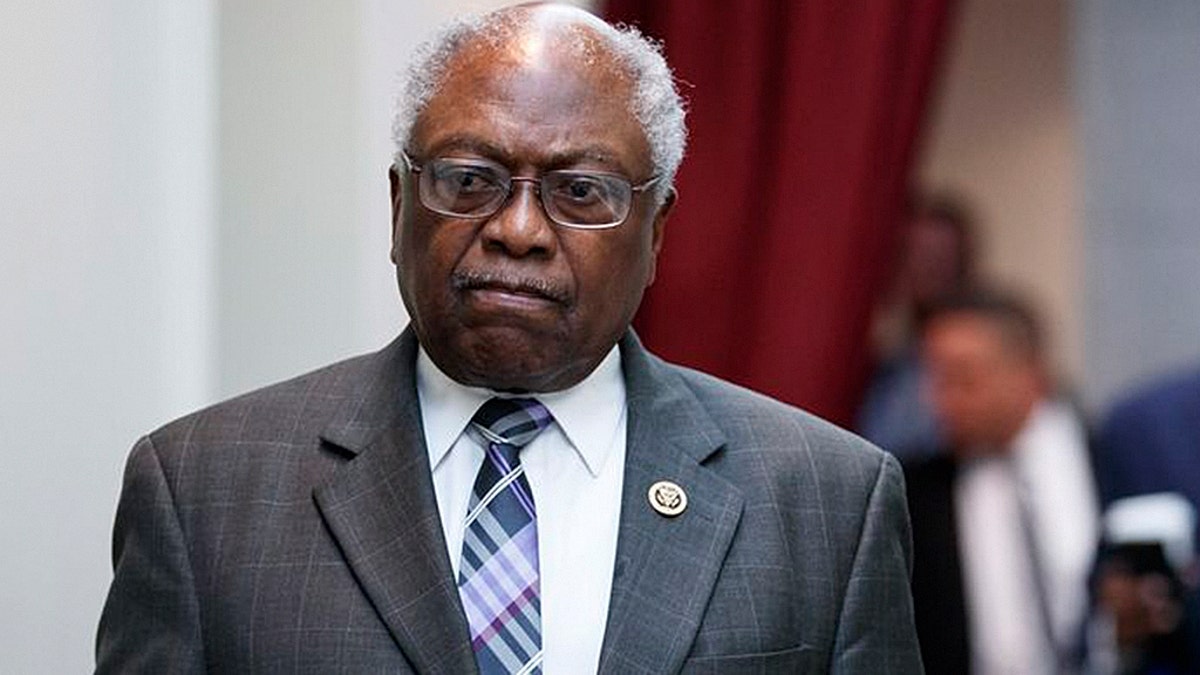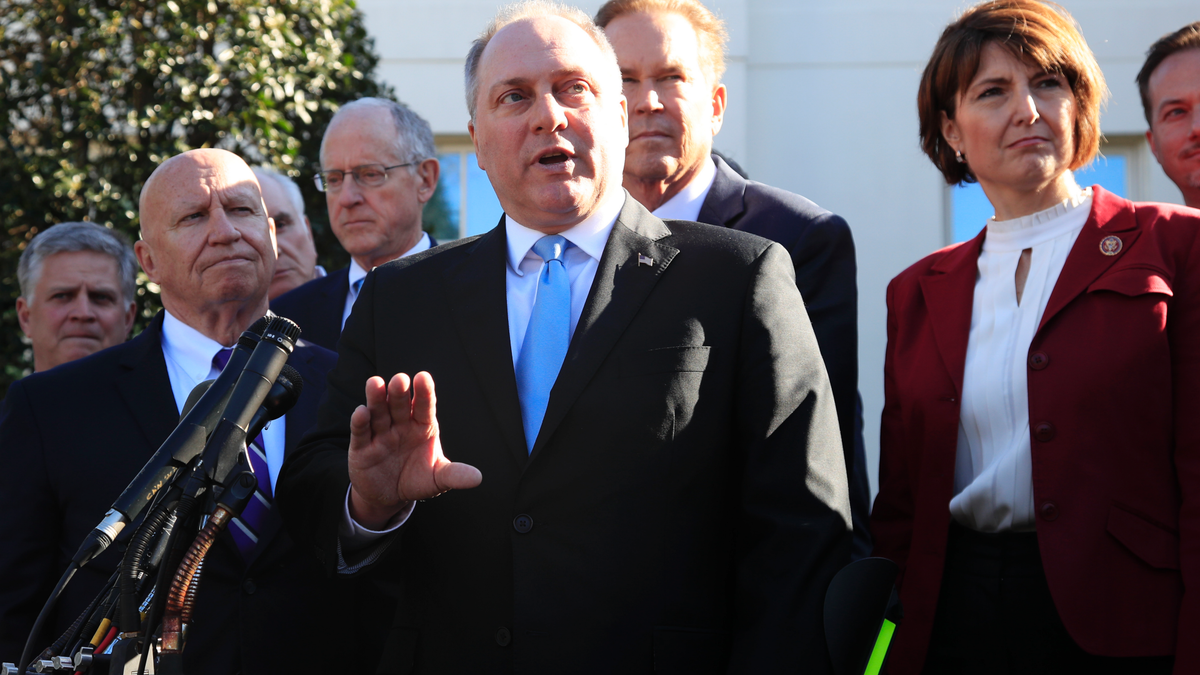Dr. Fauci on COVID-19 hearing: Avoid crowds of any type no matter where you are
Rep. Jim Jordan questions Dr. Anthony Fauci during the House coronavirus committee hearing.
Dr. Anthony Fauci told the House Select Committee on the Coronavirus Crisis that "crowds" further the spread of the coronavirus, but wouldn't "opine" on whether the government should limit widespread protests as it has businesses and churches in a testy exchange Friday with Rep. Jim Jordan, R-Ohio.
The National Institute of Allergy and Infectious Diseases (NIAID) director appeared alongside Centers for Disease Control and Prevention Director (CDC) Dr. Robert Redfield and “testing czar” Admiral Brett Giroir, a Health and Human Services official and physician. The hearing was titled "The Urgent Need for a National Plan to Contain the Coronavirus."
Jordan pushed Fauci on whether protests increased the spread of the virus, to which Fauci said that he can "make a general statement" that "crowding together particularly when you're not wearing a mask contributed to the spread of the virus." He later said any crowd, including protest crowds, would constitute a "risk" -- and that indoor crowds are a bigger problem than outdoor ones.

FILE - In this June 26, 2020, file photo Director of the National Institute of Allergy and Infectious Diseases Dr. Anthony Fauci, center, speaks during a news conference with members of the Coronavirus task force at the Department of Health and Human Services in Washington. (AP Photo/Susan Walsh, File)
FAUCI, REDFIELD TESTIFY BEFORE HOUSE CORONAVIRUS COMMITTEE: LIVE UPDATES
But Jordan appeared to suggest Fauci was applying a double standard by holding back on stating that demonstrations should be curtailed for health reasons.
Jordan asked Fauci, "should we limit the protesting?" Fauci had Jordan clarify the question, to which Jordan responded "should government limit the protesting?"
Fauci said "I'm not in a position to determine what the government can do in a forceful way," before Jordan interrupted: "You make all kinds of recommendations, you make comments on dating, on baseball, on everything you can imagine. I'm just asking, you just said, protesting increases the spread. I'm just asking you should we try to limit the protest?"
"I think I would leave that to people who have more of a position to do that," Fauci responded. "I can tell you that..."
Jordan again interrupted Fauci: "Government's stopping people from going to church, Dr. Fauci. Last week... five liberals on the Supreme Court said it was OK for Nevada to limit church services... Is there a world where the Constitution says you can favor one First Amendment liberty, protesting, over another, practicing your faith?"
"I'm not favoring anybody over anybody," Fauci said. "I'm just making a statement that's a broad statement... avoid crowds of any type no matter where you are, because that leads to the acquisition and transmission. And I don't judge one crowd versus another crowd. When you're in a crowd, particularly if you're not wearing a mask, that induces the spread."
Jordan, still not satisfied, attempted to extract a yes or no answer from Fauci, saying that there's been "no violence" at churches.
"I don't know how many times I can answer that," Fauci said. "I am not going to opine on limiting anything. ... I'm telling you what there is, the danger. And you can make your own conclusion about that. You should stay away from crowds."

Rep. Jim Jordan, R-Ohio, questions former U.S. Ambassador to Ukraine Marie Yovanovitch before the House Intelligence Committee on Capitol Hill in Washington, Friday, Nov. 15, 2019, during the second public impeachment hearing of President Donald Trump's efforts to tie U.S. aid for Ukraine to investigations of his political opponents. (AP Photo/Susan Walsh)
Jordan told Fauci about a case where two people running a gym against a coronavirus order in New Jersey got arrested before speculating that if the men were outside protesting along with their customers they would not have been.
"I'm not going to opine on who gets arrested and who does not," Fauci said. "I mean, you get where I'm going. I'm telling you as a public health official I say crowds..." Jordan jumped in again and asked Fauci whether he saw any inconsistency, likely referring to the treatment of churchgoers and business owners versus protesters.
"There's not inconsistency, congressman," a frustrated Fauci replied, likely talking about his own statements.
Jordan then said he hasn't seen cases of hairstylists attacking police officers, but added that many protesters have recently.
"And we know that protests actually increase the spread of the virus, you said that," Jordan said.
"I said crowds," Fauci shot back. "I didn't say specifically. I didn't say protests do anything."
"So the protests don't increase the spread of the virus?" Jordan asked.
"I didn't say that, you're putting words in my mouth," Fauci replied. "I can tell you that crowds are known, particularly when you don't have a mask," to add to the spread of the virus. (Minutes later, Fauci eventually specified that he considers protests to be crowds in this context.)
Jordan at one point challenged Fauci for advocating to shut down businesses but not commenting on protest restrictions: “You can’t go to work, you can’t go to school, you can’t go to church … but protesting is just fine.”
As Jordan's questioning time expired, committee Chairman James Clyburn, D-S.C., then noted that President Trump recently held a political fundraiser in Texas where masks were scarce among the attendees.
FAUCI SUGGESTS GOGGLES, EYE SHIELD FOR BETTER PROTECTION AGAINST CORONAVIRUS
The reaction to various protests during the coronavirus crisis has been highly polarized. When many Trump supporters protested against state lockdown orders early in the pandemic, many Republicans lauded the protests while Democrats condemned them as putting front-line health care workers at risk. When crowds began protesting -- in much larger gatherings than the anti-lockdown protests -- following the death of George Floyd in the custody of the Minneapolis Police Department, Democrats began to participate in the protests themselves while Republicans condemned them.
Earlier in the hearing, Fauci also told the committee that experts are optimistic the U.S. might see an effective vaccine for the coronavirus by later this year, and encouraged Americans to register if they are interested in participating in clinical trials
One vaccine, Fauci said, was in a "Phase 3 trial." He said experts are optimistic by late fall or early winter "we will have, in fact, a vaccine we can say will be safe and effective." Fauci added: "[w]e are cautiously optimistic that this will be successful" because the vaccine "clearly showed that individuals who were vaccinated mounted a neutralizing antibody response that was at least comparable, and in many respects better, than what we see... from individuals who have recovered from COVID-19."
He encouraged people to go to "coronaviruspreventionnetwork.org," where those willing to be in the clinical trials for the vaccine for "this terrible scourge" can volunteer. There were 250,000 people who indicated they were interested as of Thursday night, Fauci said.
Fauci appeared in a Washington Nationals "World Champions" mask.
The epidemiologist also discussed the NIAID's efforts to research the coronavirus, study how the virus affects children, improve testing, and develop treatments. Remdesivir, Fauci said, "showed a statistically significant improvement" in how long hospitalized patients survived, and one other drug, he said, lowered death rates.
On schools, Redfield called the decision to reopen "public health vs. public health," underscoring the difficult balance faced by officials deciding how -- or whether -- to reopen classrooms this fall.
The written testimony by the experts also addressed the effort to secure a vaccine: "The rigorous clinical testing required to establish vaccine safety and efficacy means that it might take some time for a licensed SARS-CoV-2 vaccine to be available to the general public, but there is growing optimism that one or more of these vaccine candidates will prove safe and effective by late 2020 or early 2021."
After a vaccine is proven effective, the challenge will be distributing it widely among the public.
Fauci was also asked during the hearing why the U.S. has been hit so much harder by the virus in recent months than other countries. He partially blamed what some states have done in reopening too quickly.
"We started off with a very difficult baseline of transmission that was going on at the time we tried to open up the country," he said. "The reasons for that are complex. There are some states that did it very well and there are some states that did not. And when I say did not I mean we put out... the guidelines of a gateway phase one, phase two, phase three, some were followed very carefully and some were not. And those situations in which it were not, that led to the surging that you're showing on your chart there."
The prepared testimony by the health experts expressed concern about the possible confluence of coronavirus and the flu at the same time, potentially presenting challenges to efforts to reopen schools.
"If there is COVID-19 and flu activity at the same time, this could place a tremendous burden on the health care system related to bed occupancy, laboratory testing needs, personal protective equipment and health care worker safety," their prepared testimony said.
There was also some political posturing by the top members of the committee, with Democrats slamming the Trump administration's coronavirus response and Republicans defending the president.
"On our current course, experts predict another 150,000 Americans could lose their lives" to the virus by the end of 2020, Clyburn said. "The administration has failed on testing, while they were given warnings including from this committee, that millions more tests were needed."

Rep. James Clyburn, D-S.C., walks to a closed Democratic Caucus meeting on Capitol Hill in Washington, Friday, Jan. 4, 2019. Clyburn chairs the House Select Committee on the Coronavirus Crisis. (AP Photo/Carolyn Kaster)
DR. BIRX: RANDOMIZED TRIALS SHOW BENEFIT FOR REMDESIVIR, BUT NOT HYDROXYCHLOROQUINE
Clyburn added that "the White House pressured" the CDC to change its advice that opening schools in-person presented significant dangers. "The United States coronavirus response stands out among the worst of any country in the world," Clyburn said.
"Urgent need for a plan -- that's not a title of a hearing that's a political narrative, and a false political narrative," committee Ranking Member Rep. Steve Scalise, R-La., said. He held up a large stack of papers produced by the Trump administration on responding to the coronavirus.
In defending the president, Scalise asked Fauci about a number of measures taken by the administration to contain the virus -- including shutting down travel from China early in the pandemic. In response, Fauci said that he agreed with the decisions and that he believed they saved lives.
Scalise also slammed some Democratic governors who have been criticized for allowing coronavirus positive patients to enter nursing homes. "If all governors would have followed those guidelines, thousands more seniors in nursing homes would have been alive today, if just five governors followed your plan that was developed by President Trump," he said.
Scalise further criticized China over its efforts to coverup the breakout of the disease in its early stages this year and warned about "damage" to children when schools don't reopen.

Rep. Rep. Steve Scalise, R-La., center, together with other Republican members of Congress, speaks to reporters outside the West Wing of the White House following a meeting with President Donald TrumpTuesday, March 26, 2019. Scalise is the ranking member on the House Select Committee on the Coronavirus Crisis. (AP Photo/Manuel Balce Ceneta)
CLICK HERE TO GET THE FOX NEWS APP
Redfield, in his opening statement, said public health experts are working to close disparities in how the coronavirus affects different communities -- it has hit African Americans a lot harder than other races, especially White people.
"This is the most complex public health response this nation has undertaken in more than a century. This virus is indiscriminate regarding whom and when it strikes. We can continue to learn its characteristics, its behavior and its effect on Americans across the social-economic spectrum," Redfield said.
"I want to strongly emphasize that we are not defenseless now. We have powerful tools," Redfield said.
Among them, Redfield said, are "wearing a simple mask, properly. It's critical to limiting the transmission. Be smart about social distancing and being in crowded spaces. Stay six feet apart from others if possible and be vigilant about hand hygiene."
He added: "Together, we can turn the tide of this pandemic."
Fauci's appearance before the committee comes after he was blocked by the White House from appearing in early May. The White House called such a testimony “counterproductive” in the heat of the pandemic, but allowed him to testify before Senate committees.
"The House is a setup," Trump told reporters in May. "The House is a bunch of Trump haters. They put every Trump hater on the committee. The same old stuff. They, frankly, want our situation to be unsuccessful, which means death."
Fox News' Morgan Phillips contributed to this report.





